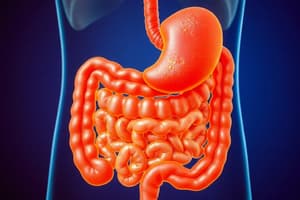Podcast
Questions and Answers
पाचन की प्रक्रिया में कौन-कौन से तत्व भोजन के पाचन में सहायक होते हैं?
पाचन की प्रक्रिया में कौन-कौन से तत्व भोजन के पाचन में सहायक होते हैं?
- लीवर द्वारा उत्पन्न बाइल
- पित्त और साइल
- पैनक्रिएटिक एंजाइम्स (correct)
- हाइड्रोक्लोरिक एसिड और पेप्सिन
पाचन सिस्टम से संबंधित कौन-सी समस्या मुख्य रूप से पानी का अवशोषण करती है?
पाचन सिस्टम से संबंधित कौन-सी समस्या मुख्य रूप से पानी का अवशोषण करती है?
- पेप्टिक अल्सर
- क्रोहन की बीमारी (correct)
- लैक्टोज असहनीयता
- आइरिटेबल बौल सिंड्रोम
पाचन सिस्टम के लिए किसके प्रमाण में उकसाव का महत्वपूर्ण स्थान है?
पाचन सिस्टम के लिए किसके प्रमाण में उकसाव का महत्वपूर्ण स्थान है?
- पेट (correct)
- पित्ताशय
- मस्तिष्क
- आंतरिकी
अंतिम संयंत्र में पोषक तत्व किस माध्यम से आपस में प्रवेश करते हैं?
अंतिम संयंत्र में पोषक तत्व किस माध्यम से आपस में प्रवेश करते हैं?
पाचन सिस्टम में किस प्रक्रिया के माध्यम से भोजन से पोषक तत्वों को सुलभ प्राप्ति होती है?
पाचन सिस्टम में किस प्रक्रिया के माध्यम से भोजन से पोषक तत्वों को सुलभ प्राप्ति होती है?
'लार' का क्या महत्व है पाचन में?
'लार' का क्या महत्व है पाचन में?
मानव शरीर में, पाचन तंत्र कितने भागों में विभाजित है?
मानव शरीर में, पाचन तंत्र कितने भागों में विभाजित है?
मानव के पाचन तंत्र में कौन-कौन से अंग होते हैं?
मानव के पाचन तंत्र में कौन-कौन से अंग होते हैं?
कैमिकल पाचन का मतलब क्या है?
कैमिकल पाचन का मतलब क्या है?
'सालाइवरी एमिलेज' कौन-सी स्थानिक अंग से उत्पन्न होती है?
'सालाइवरी एमिलेज' कौन-सी स्थानिक अंग से उत्पन्न होती है?
'मैकेनिकल पाचन' का मतलब क्या है?
'मैकेनिकल पाचन' का मतलब क्या है?
Study Notes
Life Processes: Understanding Digestion
Digestion is a fundamental life process that enables organisms to break down food and extract nutrients, converting them into forms that can be used for growth, maintenance, and energy. This process is crucial for all living entities, from single-celled organisms to complex multicellular beings like humans.
The Digestive System
In human beings, the digestive system is a long, twisting tube that extends from the mouth to the anus. It consists of several organs, including the mouth, esophagus, stomach, small intestine, large intestine, liver (not strictly part of the digestive system but closely related), and pancreas. The digestive system is also home to numerous glands and specialized cells that produce enzymes and hormones that help in the digestive process.
The Stages of Digestion
Mechanical Digestion
Mechanical digestion refers to the physical breakdown of food by crushing, cutting, and mixing it. This stage begins in the mouth, where the action of chewing, saliva, and teeth break down food into smaller particles, known as chyme.
Chemical Digestion
Chemical digestion refers to the breakdown of complex food molecules into simpler forms using enzymes. In the digestive system, these enzymes are produced by specialized cells in different organs. For example, salivary amylase, produced in salivary glands, begins the breakdown of carbohydrates. In the stomach, hydrochloric acid and enzymes like pepsin continue the process of digestion. The small intestine contains pancreatic enzymes that break down proteins, fats, and carbohydrates, while bile produced by the liver and stored in the gallbladder helps in the emulsification and absorption of fats.
Absorption
Absorption is the process of taking in nutrients and water from digested food. The small intestine is the primary site of absorption, as its long and folded surface area allows for the maximum absorption of nutrients. The absorbed nutrients enter the bloodstream and are transported to cells throughout the body.
Elimination
Elimination is the process of removing undigested food, waste, and byproducts from the digestive system. The large intestine, or colon, is responsible for water absorption and the formation of solid waste, which is then expelled from the body through the rectum and anus.
Digestive Disorders
Various digestive disorders can affect the digestive system, including:
- Gastroesophageal reflux disease (GERD)
- Peptic ulcers
- Irritable bowel syndrome (IBS)
- Crohn's disease
- Ulcerative colitis
- Celiac disease
- Lactose intolerance
These disorders can lead to symptoms such as abdominal pain, bloating, constipation, diarrhea, and nausea. Treatment may include medications, lifestyle changes, or surgery, depending on the specific condition.
Conclusion
Digestion is a vital life process that enables organisms to extract nutrients from food, supporting growth, maintenance, and energy production. A thorough understanding of digestion can help us appreciate the remarkable complexity of our bodies and the dynamic interplay of the different organs and systems that make up the digestive system.
Studying That Suits You
Use AI to generate personalized quizzes and flashcards to suit your learning preferences.
Description
डाइजेस्टियन एक महत्वपूर्ण जीवन प्रक्रिया है जो जीवों को खाना तोड़कर पोषक तत्वों को अलग करने में सहायक होती है, जिसे उन्हें वृद्धि, रख-रखाव, और ऊर्जा के रूप में उपयोग के लिए परिणामस्वरूप परिणात किया जा सकता है।




